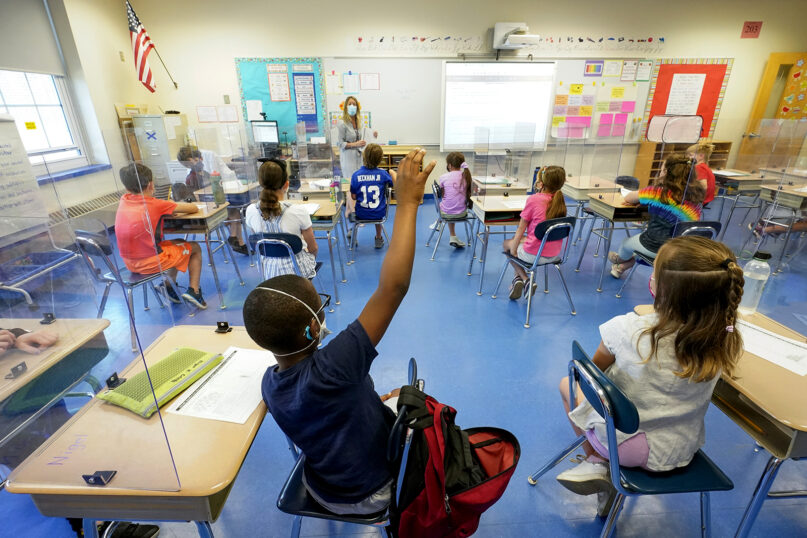(RNS) — School board meetings across the nation have grown contentious in recent months as Americans have stepped up to microphones to protest what they’ve been told is a pandemic of teaching about critical race theory — a method of legal analysis practiced in law schools and graduate programs that examines how racism is embedded in our social institutions. Educators, in return, have responded that they don’t teach primary and secondary schoolers CRT.
This drama, which has become a key issue in political campaigns that will be decided next month, is based on fears that teaching about race will challenge the traditional story of an unproblematic and unquestionably exceptional America. In that, the fight over CRT is nothing new: It’s just the latest attempt by the political right playbook to distort the teaching of history.
Since the 1950s, conservatives have advocated for textbooks that promote capitalism and attack communism, that denounce civil rights, feminism and resistance to the war in Vietnam.
Historians, meanwhile, have argued for teaching a more nuanced American history — warts and all — that more fully reflects the nation’s ethnic and cultural diversity. In the 1990s, the political right, led by Lynne Cheney and promoted by Rush Limbaugh and other conservative media figures, won a major victory when its opposition to the results of the yearslong, $2 million project to create National History Standards led to a 99-1 vote in the U.S. Senate to reject them. Revised standards proved more acceptable but were not widely adopted.
RELATED: The battle over CRT is a manufactured crisis. Here’s why we still have to fight it.
Since then, the right has turned its efforts to the local and state level, with conservative school board members promoting state standards aligned more with their political views than with historical consensus. Right-wing political action committees recruit conservative school board candidates and pour money into their elections. Today’s attacks on CRT are simply the most recent chapter in this fight as conservative media and groups have orchestrated national outrage.
Religious conservatives have been key to rewriting the story that students hear about America. They have had great success in influencing history teaching in Christian schools, home schooling — and, as a result of recent Supreme Court decisions — in private schools using publicly funded aid programs.
What does success look like? Christian schools most often rely on one of three curricula published by Abeka Books, Bob Jones University or Accelerated Christian Education. Created in the 1970s in the wake of desegregation and Supreme Court rulings about prayer in public schools, they have given several generations of students a distorted understanding of history defined by conservative evangelical Protestantism.
These textbooks describe how God has acted through time, favoring his chosen people, from the Jews of the Bible to modern American Protestants. Conveniently, God endorses policies conservatives espouse, from low taxes to rigid gender divisions (women control the household, men the public sphere). They disparage non-Christian civilizations and denounce support for the poor or public works as “socialism.”
RELATED: Patriot games: CRT, Christian nationalism and a battle for the real truth of America
Even though the Reformation restored Christianity, the modern world went astray: As liberals challenged godly conservatives, revolutions and socialism disrupted the political order. World Wars I and II were punishments for the worst of European sins: Darwinism and biblical modernism.
After the Second World War, Christian countries rebounded with greater conversion efforts, capitalist investments and anti-communist crusades, while reprehensible secular nations promoted socialist policies and godless ideologies. Liberal political goals, students learn, reflect the sin of humanism. They are able to judge other peoples and nations from a position of religious and cultural superiority.
In pushing back against “CRT” — more accurately, against an inclusive history of the United States — conservative parents and politicians are not demanding to replace their schools’ history curriculum with a Christian worldview. But by downplaying the role of race and safeguarding ideas about American exceptionalism, they are showing no less disregard for historical scholarship. Their criticism of anti-bias teaching fosters the belief that the United States was founded as a white Christian nation and implicitly urges its restoration.
You won’t hear any of this in their arguments. In fact, laws passed to address the supposed teaching of CRT do not stipulate what should be taught but rather issue ambiguous and inhibiting prohibitions, in essence requiring the teaching of an inaccurate, sectarian and polemical American history. Students whose history education is reduced to a mythic, religiously and politically partisan pseudo-history will be ill-prepared to understand the complexities of their nation or to thrive in the world they will inherit.
(Kathleen Wellman is the Dedman Family Distinguished Professor of History at Southern Methodist University in Dallas and the author of “Hijacking History: How the Christian Right Teaches History and Why It Matters.” The views expressed in this commentary do not necessarily reflect those of Religion News Service.)





